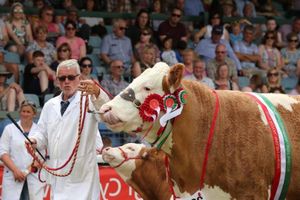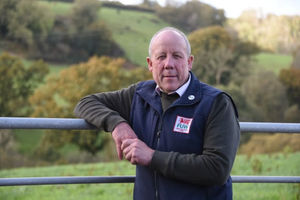Farmers along the Welsh/English border are facing testing and licences to prevent Bluetongue virus spreading, after the Welsh Government refused to align with an England-wide restricted zone
Farmers along the Welsh/English border are facing testing and licences to prevent Bluetongue virus spreading, after the Welsh Government refused to align with an England-wide restricted zone
Farming unions and a Powys politician have claimed the two tier farming system will mean Welsh farmers face more restrictions, costs and red tape.
The Farmers Union of Wales said that enforcing a border between Wales and England is ‘both a futile endeavour and wholly impractical’ while the National Farmers Union of Wales are concerned about the cost and practicality of the controls.
Huw Irranca-Davies MS, Deputy First Minister and Cabinet Secretary for Climate Change and Rural Affairs said the imposition of an England-wide Bluetongue Restricted Zone on July 1 will mean Wales will lose the security of having a two-county buffer between potentially infected livestock in England and the Welsh border.
In a statement he said; “This change increases the risk of disease incursion into Wales, either through the movement of infected livestock, or the ingress of virus carrying midges from across the border.
“My decision is to attempt to hold back the disease for as long as we can. Although livestock moves to live will be permitted with a negative premovement test, we will have time to monitor the effects of Bluetongue in livestock dense areas of England and crucially, additional time for Welsh keepers to vaccinate their animals against the disease.
“Participants in the Bluetongue roundtable meeting were unanimous in their support for vaccination as the best way of insuring flocks and herds against any future incursion of the disease.
“I acknowledge there will be licencing requirements, livestock testing costs and other commercial pressures arising from my decision.”



He said the picture is dynamic and evolving and so he committed to keeping the policy under
regular review, based on the evidence “on the ground” in Wales, and the other parts of Great Britain.
He added;“Despite our best efforts, there is a risk Bluetongue will be confirmed in Wales, in which case relevant disease control actions will be required.”
Brecon and Radnorshire Senedd Member James Evans MS criticised the Welsh Government’s decision not to align with England’s bluetongue strategy, warning that the approach could create disruption and disadvantage for Welsh farmers, particularly those operating near the border.
James Evans MS said: “This is exactly the scenario I warned about, a two-tier farming system where Welsh farmers face more restrictions, more costs and more red tape than their counterparts across the border.
“Many of my constituents rely on cross-border livestock movements, especially to markets like Hereford. The Welsh Government’s decision not to align with England will now cause unnecessary disruption at the very worst time.
“Of course we need to protect against disease, but English farmers are doing that too. Vaccinations are key but, in the meantime, we should have a joined-up UK approach to tackling bluetongue, not a policy that puts Welsh producers at a competitive disadvantage. This is a setback for common sense and for the rural economy.
“Welsh Government’s decision today will impact our Shows, none more so than the Royal Welsh Agricultural Show, because of different regulations each side of the border. The RWAS has already announced an exclusion of cattle, sheep and goats from England, resulting in a significant drop in entrants this year and potentially a major economic hit to the Show itself. Welsh Government’s statement means this decision to exclude entrants will remain in place.”
FUW President, Ian Rickman said: “As farmers our first instinct is to keep any disease out, but in order to maintain economic stability within the industry, the FUW has repeatedly lobbied the Welsh Government to simultaneously align with the changes proposed in England, as the sheer number of cross-border holdings and trading activity will be vastly disrupted with this policy decision, meanwhile midges that carry and spread the virus would not respect any such boundaries.
“Defra’s decision will inevitably bring disease to the Welsh-English border and places both the Welsh Government and the wider industry in an impossible situation. However, given this ‘when’ not ‘if’ circumstance of Bluetongue encroachment into Wales, the FUW believes that enforcing a border between Wales and England is both a futile endeavour and wholly impractical.
“The on-farm practicalities involved with adhering to this policy position brings with it a wealth of barriers and complications. The mechanics of issuing licences in a timely manner, arranging and conducting pre-movement sampling and testing, co-ordinating haulage and the extortionate costs and disruption to cross-border holdings and trade, it is feared that the decision to hold back the tide will be entirely unattainable and impractical.
They called for vaccination, clear guidelines and advice for the 550 cross border farming businesses and livestock markets straddling the border and for a timeframe for reviews,
NFU Cymru President Aled Jones said: “There are many unknowns about how BTV-3 could impact our herds and flocks across Wales and Welsh farmers are extremely worried about the threat of the spread of the disease.
“However, we have significant concerns about the lack of resources and capacity within the laboratories and Animal and Plant Health Agency to deliver against the potential demand for each and every animal to be tested and licensed, given the significant amount of stock that move across the border from England to Wales for management, welfare and trading purposes.
“We have raised these concerns directly with Welsh Government and continue to seek assurances that this policy can practically be delivered. We understand that going forward the costs of testing will be borne by the farmer, which will cause a huge increase to the cost of trading.
“Welsh Government has committed to keeping their decision under review. We are about to enter an extremely important time of the year in the farming calendar, with many farmers looking to trade breeding stock and store stock ahead of the autumn and winter months. “Welsh Government must ensure that a sustainable solution is found as soon as possible that negates the need for excessive testing and licencing, balancing the impact of the disease against the potential huge costs of industry delivering and complying with the controls announced today.
“NFU Cymru believes the best method for farmers to protect their herds and flocks from infection is via vaccination. We support a campaign to promote vaccine use and facilitate the maximum number of doses being available on Welsh farms as quickly as possible. We would urge all farmers to speak to their vets to discuss a vaccination plan for their farm.”
The latest information on Bluetongue in Wales can be found online at Bluetongue virus (BTV) | GOV.WALES





